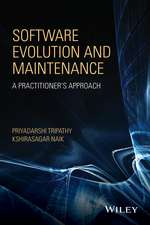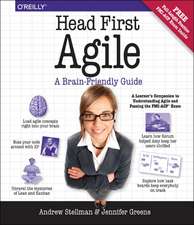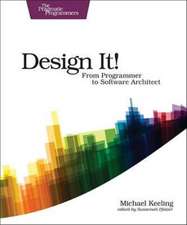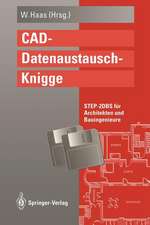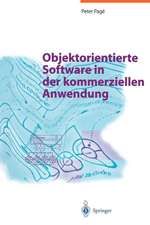Model Driven Engineering Languages and Systems: 8th International Conference, MoDELS 2005, Montego Bay, Jamaica, October 2-7, 2005, Proceedings: Lecture Notes in Computer Science, cartea 3713
Editat de Lionel Briand, Clay Williamsen Limba Engleză Paperback – 19 sep 2005
Din seria Lecture Notes in Computer Science
- 20%
 Preț: 1061.55 lei
Preț: 1061.55 lei - 20%
 Preț: 307.71 lei
Preț: 307.71 lei - 20%
 Preț: 438.69 lei
Preț: 438.69 lei - 20%
 Preț: 579.30 lei
Preț: 579.30 lei -
 Preț: 410.88 lei
Preț: 410.88 lei - 17%
 Preț: 427.22 lei
Preț: 427.22 lei - 20%
 Preț: 596.46 lei
Preț: 596.46 lei - 15%
 Preț: 448.04 lei
Preț: 448.04 lei - 20%
 Preț: 353.50 lei
Preț: 353.50 lei -
 Preț: 389.49 lei
Preț: 389.49 lei - 20%
 Preț: 309.90 lei
Preț: 309.90 lei - 20%
 Preț: 645.28 lei
Preț: 645.28 lei - 20%
 Preț: 763.23 lei
Preț: 763.23 lei - 15%
 Preț: 580.46 lei
Preț: 580.46 lei - 20%
 Preț: 310.28 lei
Preț: 310.28 lei - 20%
 Preț: 655.02 lei
Preț: 655.02 lei - 20%
 Preț: 1183.14 lei
Preț: 1183.14 lei - 20%
 Preț: 340.32 lei
Preț: 340.32 lei -
 Preț: 449.57 lei
Preț: 449.57 lei - 20%
 Preț: 591.51 lei
Preț: 591.51 lei - 18%
 Preț: 938.83 lei
Preț: 938.83 lei - 20%
 Preț: 337.00 lei
Preț: 337.00 lei - 20%
 Preț: 649.50 lei
Preț: 649.50 lei - 20%
 Preț: 607.40 lei
Preț: 607.40 lei - 20%
 Preț: 1414.79 lei
Preț: 1414.79 lei - 20%
 Preț: 1024.44 lei
Preț: 1024.44 lei - 20%
 Preț: 583.40 lei
Preț: 583.40 lei - 20%
 Preț: 453.32 lei
Preț: 453.32 lei - 20%
 Preț: 575.49 lei
Preț: 575.49 lei - 20%
 Preț: 1075.26 lei
Preț: 1075.26 lei - 20%
 Preț: 585.88 lei
Preț: 585.88 lei - 20%
 Preț: 825.93 lei
Preț: 825.93 lei - 17%
 Preț: 360.20 lei
Preț: 360.20 lei - 20%
 Preț: 763.23 lei
Preț: 763.23 lei - 20%
 Preț: 340.32 lei
Preț: 340.32 lei - 20%
 Preț: 504.58 lei
Preț: 504.58 lei - 20%
 Preț: 369.13 lei
Preț: 369.13 lei - 20%
 Preț: 580.93 lei
Preț: 580.93 lei - 20%
 Preț: 343.62 lei
Preț: 343.62 lei - 20%
 Preț: 350.21 lei
Preț: 350.21 lei - 20%
 Preț: 583.40 lei
Preț: 583.40 lei - 20%
 Preț: 583.40 lei
Preț: 583.40 lei - 15%
 Preț: 438.59 lei
Preț: 438.59 lei - 20%
 Preț: 341.95 lei
Preț: 341.95 lei - 20%
 Preț: 238.01 lei
Preț: 238.01 lei - 20%
 Preț: 538.30 lei
Preț: 538.30 lei
Preț: 667.57 lei
Preț vechi: 834.46 lei
-20% Nou
Puncte Express: 1001
Preț estimativ în valută:
127.78€ • 138.84$ • 107.40£
127.78€ • 138.84$ • 107.40£
Carte tipărită la comandă
Livrare economică 21 aprilie-05 mai
Preluare comenzi: 021 569.72.76
Specificații
ISBN-13: 9783540290100
ISBN-10: 3540290109
Pagini: 744
Ilustrații: XVI, 724 p.
Dimensiuni: 155 x 235 x 35 mm
Greutate: 1.03 kg
Ediția:2005
Editura: Springer Berlin, Heidelberg
Colecția Springer
Seriile Lecture Notes in Computer Science, Programming and Software Engineering
Locul publicării:Berlin, Heidelberg, Germany
ISBN-10: 3540290109
Pagini: 744
Ilustrații: XVI, 724 p.
Dimensiuni: 155 x 235 x 35 mm
Greutate: 1.03 kg
Ediția:2005
Editura: Springer Berlin, Heidelberg
Colecția Springer
Seriile Lecture Notes in Computer Science, Programming and Software Engineering
Locul publicării:Berlin, Heidelberg, Germany
Public țintă
ResearchCuprins
Keynote Address I.- Keynote Address I: Model Driven Development for Distributed Real-Time and Embedded Systems.- Process.- Activity Diagram Patterns for Modeling Quality Constraints in Business Processes.- UML4SPM: A UML2.0-Based Metamodel for Software Process Modelling.- Realizing Model Driven Security for Inter-organizational Workflows with WS-CDL and UML 2.0.- Product Families, Reuse.- Code Generation from UML Models with Semantic Variation Points.- Composing Domain-Specific Languages for Wide-Scope Software Engineering Applications.- Model Typing for Improving Reuse in Model-Driven Engineering.- State/Behavioral Modeling.- UML Vs. Classical Vs. Rhapsody Statecharts: Not All Models Are Created Equal.- Evaluating the Effect of Composite States on the Understandability of UML Statechart Diagrams.- Computing Refactorings of Behavior Models.- Aspects.- Dynamic Secure Aspect Modeling with UML: From Models to Code.- Performance Analysis of UML Models Using Aspect-Oriented Modeling Techniques.- Domain Models Are Aspect Free.- Design Strategies.- Representing and Applying Design Patterns: What Is the Problem?.- Properties of Stereotypes from the Perspective of Their Role in Designs.- A Modelling and Simulation Based Approach to Dependable System Design.- Model Transformations.- Extending Profiles with Stereotypes for Composite Concepts.- Transformation from CIM to PIM: A Feature-Oriented Component-Based Approach.- Weaving Executability into Object-Oriented Meta-languages.- Keynote Address II.- Keynote Address II: Domain-Specific Modeling: No One Size Fits All.- Model Refactoring.- Refactoring OCL Annotated UML Class Diagrams.- Replicators: Transformations to Address Model Scalability.- Simplifying Transformations of OCL Constraints.- Quality Control.- Lessons Learned from Automated Analysis of Industrial UML Class Models (An Experience Report).- Reliability Prediction in Model-Driven Development.- Model-Based Scalability Estimation in Inception-Phase Software Architecture.- MDA I.- Explicit Platform Models for MDA.- Integrated Model-Based Software Development, Data Access, and Data Migration.- Invited Presentation I: Lessons Learned, New Directions, and Migration Plans for Model-Driven Development of Large Scale Software Based Systems.- Automation I.- Concepts for Comparing Modeling Tool Architectures.- Scenario Construction Tool Based on Extended UML Metamodel.- Invited Presentation II: Experiences in Applying Model Based System Testing Generation.- UML 2.0.- The Impact of UML 2.0 on Existing UML 1.4 Models.- Towards UML 2 Extensions for Compact Modeling of Regular Complex Topologies.- Using UML 2.0 Collaborations for Compositional Service Specification.- Industrial Experience.- Model-Driven Engineering in a Large Industrial Context — Motorola Case Study.- Using a Domain-Specific Language and Custom Tools to Model a Multi-tier Service-Oriented Application — Experiences and Challenges.- Invited Presentation III: The Architects’ Workbench — Research in the Trenches.- Crosscutting Concerns.- Uniform Support for Modeling Crosscutting Structure.- Modeling Crosscutting Services with UML Sequence Diagrams.- A Formal Enforcement Framework for Role-Based Access Control Using Aspect-Oriented Programming.- Modeling Strategies I.- A Domain Model for Dynamic System Reconfiguration.- Exceptional Use Cases.- MDA II.- Modeling Turnpike Frontend System: A Model-Driven Development Framework Leveraging UML Metamodeling and Attribute-Oriented Programming.- Simplifying Autonomic Enterprise Java Bean Applications Via Model-Driven Development: A CaseStudy.- Automation II.- Automated Invariant Maintenance Via OCL Compilation.- SelfSync: A Dynamic Round-Trip Engineering Environment.- UML for Document Modeling: Designing Document Structures for Massive and Systematic Production of XML-based Web Contents.- Modeling Strategies II.- Metamodel Reuse with MOF.- Modeling the User Interface of Multimedia Applications.- An Ontology-Based Approach for Evaluating the Domain Appropriateness and Comprehensibility Appropriateness of Modeling Languages.- Workshops, Tutorials and Panels.- Workshops at the MODELS 2005 Conference.- Tutorials at the MODELS 2005 Conference.- Panels at the MODELS 2005 Conference.
Caracteristici
Includes supplementary material: sn.pub/extras

